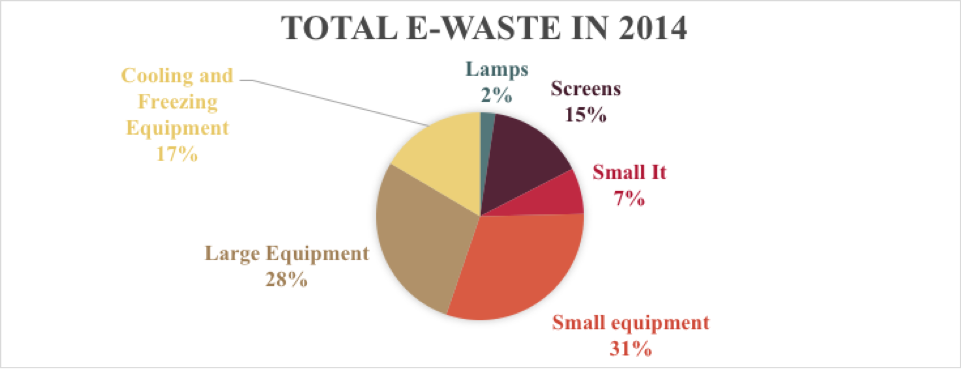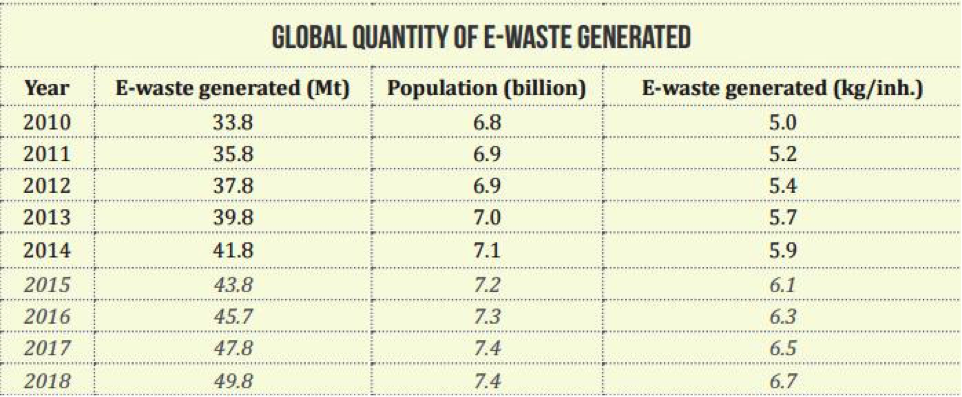First assignment of group n° 041
Resources used by the team[modifier | modifier le wikicode]
Videos:
http://storyofstuff.org/movies/story-of-electronics/
https://www.youtube.com/watch?v=dd_ZttK3PuM
https://www.youtube.com/watch?v=XghIomWbEQA
http://unu.edu/publications/articles/rich-and-poor-nations-can-link-up-to-recycle-e-waste.html
http://www.wired.com/2014/12/product-design-and-recycling/
| |
Videos:
https://www.youtube.com/watch?v=Y_fHAIfoqcQ
https://www.youtube.com/watch?v=yDSWGV3jGek
https://www.youtube.com/watch?v=hUK4cgyqsqo
http://www.theguardian.com/world/2013/dec/14/ghana-dump-electronic-waste-not-good-place-live
http://www.electronicstakeback.com/resources/problem-overview/
http://www.dw.com/en/report-highlights-growing-global-e-waste-problem/a-18448012
| |
Videos:
https://www.youtube.com/watch?v=O-_ubuFhqQA
https://www.youtube.com/watch?v=EnqvfNstr_4
https://www.youtube.com/watch?v=ejB6NDIwdXo
Book :
http://www.ksewaste.org/ewaste_why.htm
http://www.theguardian.com/sustainable-business/electronic-waste-developing-world
http://www.zerowaste.sa.gov.au/e-waste/what-can-be-recycled-from-e-waste | |
Videos:
https://www.youtube.com/watch?v=pr1zQrXM_7s
https://www.youtube.com/watch?v=-j_Zohgg4S8
https://www.youtube.com/watch?v=q9jwLPFEKus
Book :
http://www.repubblica.it/ambiente/2015/08/31/news/rifiuti_elettronici_raee-121961086/
http://finanza.repubblica.it/News_Dettaglio.aspx?code=171&dt=2015-08-31&src=TLB
http://www.bbc.com/news/technology-32353659
http://www.bbc.com/future/story/20140218-why-your-old-tech-holds-treasure
| |
Videos:
https://www.youtube.com/watch?v=qYSCc2lK4PI
https://www.youtube.com/watch?v=2I_Jfwbzovo
https://www.youtube.com/watch?v=JPY8osKe8qM
Book :
http://www.sancara.org/2013/11/agbogbloshie-la-discarica-e-weste.html
http://comune-info.net/2014/09/terra-inquinata-mondo-agbogbloshie/
| |
Videos:
https://www.youtube.com/watch?v=rhMilwQHpzc
https://www.youtube.com/watch?v=vgUWV2jPEyA
https://www.youtube.com/watch?v=kTWwsDAl4jE
Book :
http://www.cbsnews.com/news/following-the-trail-of-toxic-e-waste/
http://interactive.aljazeera.com/aje/2015/ewaste/index.html
http://news.nationalgeographic.com/news/2005/11/1108_051108_electronic_waste.html
http://www.sciencedaily.com/releases/2011/05/110531084958.htm | |
Videos:
https://www.youtube.com/watch?v=roBdT_4dXRs
https://www.youtube.com/watch?v=qtT2EZ_d3Xk
https://www.youtube.com/watch?v=zrkaQseqk4Q
Book :
http://www.consoglobe.com/les-champions-du-gaspillage-electronique-cg
http://mrps.backmarket.fr/gaspillage/
http://sometimes-interesting.com/2011/07/17/electronic-waste-dump-of-the-world/
|
First Description of our project :[modifier | modifier le wikicode]
E-Waste Recycling[modifier | modifier le wikicode]
1. What problem do you want to solve ?
Nowadays, the number of people using electronics equipment is constantly growing. According to the Consumer Electronics Association, the average American household spent $1,380 over the past year on consumer electronics (CE), such as HDTVs, cell phones, video game systems, computers, portable music devices, and Blu-ray players.
E-waste represents 2% of America’s trash in landfills, but it equals 70% of their overall toxic waste, in 2014 was 41.8 million metric tones (Mt) and according to United Nations University, it is forecasted to increase up to 50Mt in 2018.
As the table shows, the E-waste generated by each person in the world was 5, 9 kg/Inh. in 2014, which illustrates a dramatic increase in comparison to 2010. The steady and constant growth rate indicates that this problem will become bigger and bigger.
2. Why does this problem exist?
The correlation between IT progress and e-waste cannot be denied. Every year, a lot of companies come up with new technological devices, which reduce the life cycle of the previous products and stimulate the consumers to purchase more products at the same time. The life cycle is affected not only by the development of new devices, but also by the mind-set of firms: companies just aim to make a profit without thinking about the consequences.
Technology companies bear the question of product life cycle in mind when designing their products. For example, it has been widely acknowledged that the life of tech-products, such as smartphones, has to be 18 months. By that, companies aim to improve their profits, due to the fact that the cost of repairements sometimes is more expensive than the price of the same product. According UNEP just the 44% of consumers are used to repairing their smartphones, furthermore their batteries have a life-duration about 300-400 cycles which means 2 or 3 years.
For instance, Apple perfectly illustrates that way of thinking: every 6 months the enterprise brings forward a new model of IPhone making the last one obsolete. Another factor that increases the waste is the planned obsolescence: Firms project apparatus which last less and less time compelling people to buy a new one. Furthermore, companies induce customer to purchase instead of repair, increasing the price for fixing the device.
All in all, people are not used to repair their smartphones or laptops and are induced to replace them with new ones. The industry is stimulating this development by the continuous extension of their product portfolios. Although companies are well aware of the fact, that they are causing this consumer behavior, they barely offer any recycling programs. In order to avoid those costly programs, they prefer to ship their e-waste to third-world countries, such as Agbogbloshie, Ghana, which has been alleged to be at the center of a legal and illegal exportation network for the environmental dumping of electronic waste (e-waste) from industrialized nations . The pollution in this area was really high and presents a serious health problem for the people who live there. In fact, the burning of the plastics and metals of electronics equipment has serious consequences on the population´s health, with studies showing that 80% of the e-waste workers have dangerous levels of lead in their blood.
3. What breakthrough are you committed to creating?
We think that in order to solve the e-waste issue we should convince people, companies and government to recycle instead of throwing away the apparatus. This can be achieved in different ways.
Firstly, through an intensive campaign we should make the consumer understand how dangerous the e-waste is. This campaign has to target the political class as well. The situation cannot change if governments do not act. They should regulate with more narrow rules the waste treatment of technological devices. Government could boost recycle by reducing the cost of recycling through giving subsidy to the enterprises. Some countries have started to arrange a solution that allows us to recycle 65% of the waste, but the problem is that the other 35% finishes in poor countries such as Ghana or in other developing countries.
Secondly, consumers have to understand that their consumer behavior is causing the tremendous amount of e-waste. Despite all the stimuli and influences of the big companies, it is still the consumers that make the final purchase decision. We think, that it is necessary to clearly illustrate the impact of individual consumers. This could for instance be done by movies, in which the procurement from the assembly work in the Chinese factories up to the dumping in third world countries is shown.
Furthermore, the creation of central recycling spots is inevitable. As mentioned in the previous section, companies barely offer and in house recycling, or other central recycling solutions. As a consequence, consumers do not know where to dispense their products. One of our targeted breakthroughs is to overcome this. The general idea behind is, that if consumers are aware of the possibility to recycle and are informed about central recycling locations, they might be more inclined to do so. In addition, an organized a central collection of e-waste could lead to better-coordinated de assembly processes, thereby avoiding the “simple” shipping to third world countries.
Finally, we think that the exploitation of the third world has to be stopped and compensated. Our consumer behavior has caused the creation of big and toxic trash areas. In order to somehow profit from this situation, people start working in this areas to seek for valuable materials. This job, which is often done by children, causes serious health issues and pollutes the entire environment. Eventually, we want to find a fair solution that incorporates all the stakeholders of this supply chain.

